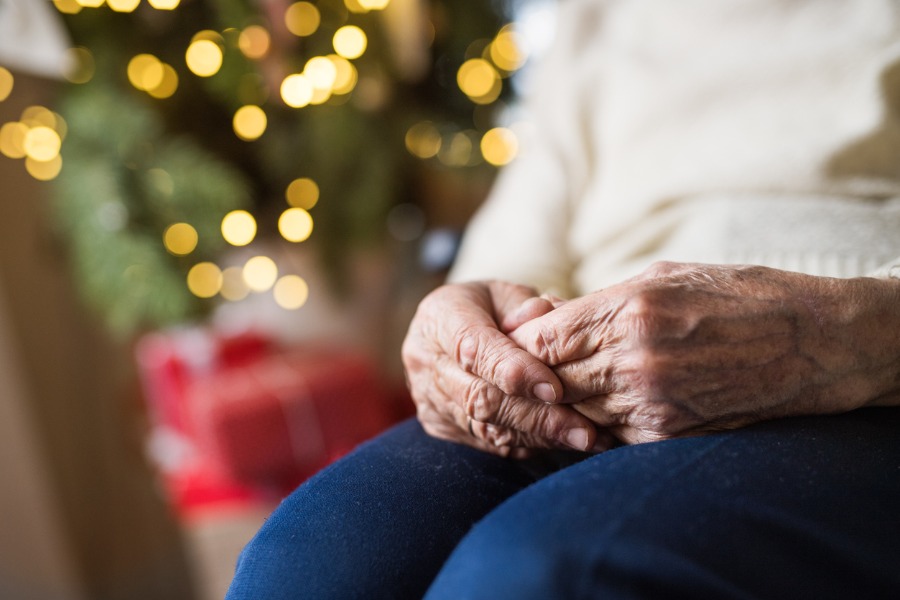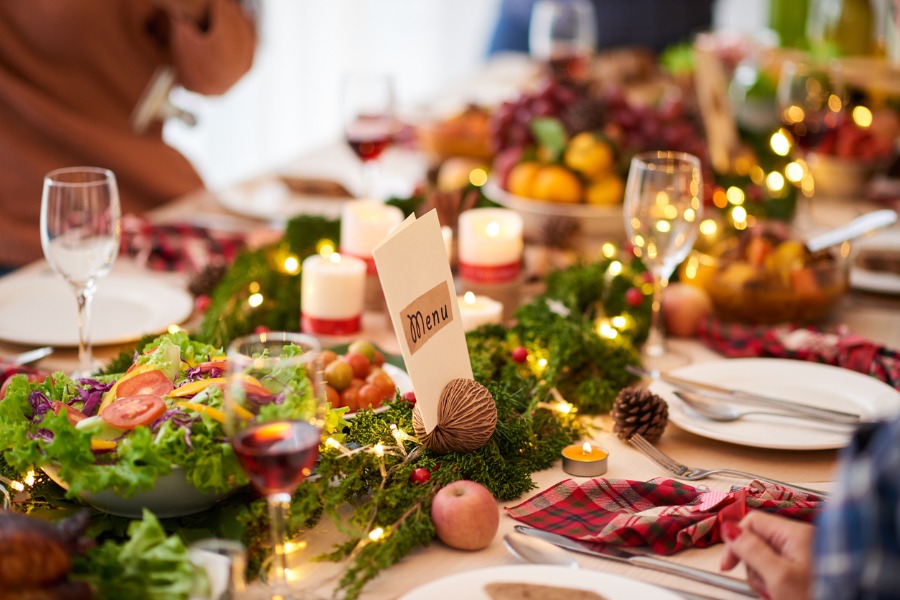
The holidays aren’t always joyous ocassions. This is true despite the smiling faces and festive décor that we often see in magazines and on television. There are many reasons why holiday grief might be your reality this year. Perhaps your reason looks like this:
- Purchasing gifts and throwing lavish parties is daunting because you’re saddled with mounting bills, endless doctor’s appointments and a reduced work schedule as you take care of a loved one who is in the later stages of Alzheimer’s disease.
- You’re exhausted and stuck working for a company that leaves you less than satisfied because you can’t afford to lose your medical insurance or the paid time off you’ve accrued after years of service.
- Your spouse passed away this year, and you are lonely and left with the realization that he’ll never again wrap a present to place under the tree.
- Your health is changing seemingly quickly, and there’s a lot of fear and uncertainty as your diagnosis progresses or you consider options such as hospice care.
If you’re unsure about how to get through the holidays and maintain some of the cheer that you’ve enjoyed in years past, Salus Homecare offers a little encouragement and advice to make coping with holiday grief a bit easier.
You Are Not Alone in Coping with Holiday Grief

When life throws curve balls your way, it’s easy to feel like you’re on an island and alone in experiencing this kind of holiday grief, stress and pain. Regardless of what you are going through, it’s important to know that you are NOT alone.
In times like this, it is valuable to consider your faith. For most of us, during difficult times like these, we yearn for a greater connection to our spiritual selves and when we find it, we find greater strength, greater hope and greater peace. Seek for that and you will find it.
Additionally, local grief support groups can provide comfort and reassurance for new widows or widowers. The family facing a diagnosis of Alzheimer’s or someone who is hurting because of the stressors that come from a serious medical condition also benefits when surrounded by support.
If you’ve recently lost a loved one who benefited from hospice care, reaching out to your bereavement counselor is a great way to find support in coping with holiday grief. Your counselor can also connect you with support groups so you have the opportunity to meet people who are or have been where you are today.
Connecting with a grief support group will grant you unique opportunities to better understand important coping skills, learn about how others have made it through this difficult stage in life or simply vent. There really is nothing like knowing that others have been where you are today, and finding your village is a great way to gain a new perspective or simply realize how normal the things you’re experiencing really are.
Helping A Loved One to Find Grief Support

It is sometimes extremely difficult to reach out and search for support when you’re feeling disconnected or isolated because of something that you’re going through in life. So, if you know someone who is in a difficult place this holiday season, take some time to research support groups on their behalf. Reach out to their bereavement counselor. Ask that professional to check in with your loved one if you feel comfortable doing so. Or, just take some time to visit them and let them know that they are not alone. While they might not be immediately receptive to the help, your efforts might be enough to help them find a little peace and contentment as they grieve. That just might be the best gift you can give them this holiday season.
It’s Okay to Feel Different

Because of the images we see on television and the stories we hear on social media, we often walk into the holidays expecting them to be a joyous time of year. Sometimes, it’s necessary to reframe those expectations a little. Don’t set yourself up for disappointment.
If your mom isn’t around to make the holidays pies or your dad’s exuberant laugh won’t fill the room this year because of a serious medical condition, your experiences will be different than it was in years past. That is okay. Thinking about this ahead of time can help you feel grateful; grateful for the blessing of having had those experiences with those you love. Treasure them and consider what you might do or how you might react. This can help you to avoid a lot of disappointment and heartache.
Honoring Your Loved One while Coping with Holiday Grief

If your loved one recently passed or is facing a serious medical condition that prevents them from being as present in your celebrations, honor them in some way to help make your holidays feel a little brighter.
Here are some ideas:
- Choose your loved one’s favorite dish, and make sure it’s present on your holiday table.
- Pray together, ask for comfort and give thanks.
- Go around the table and ask all of your guests to make a special toast in your loved one’s honor or memory.
- Create a playlist of holiday songs that remind you of your loved one’s happiest times.
- Lay down a special tablecloth and fabric markers, and ask all of your guests to write down a favorite memory or thought about your loved one.
- If your family partakes in holiday blessings, add one of your loved one’s favorite lyrics, quotes or poems to the blessing.
- Give monetarily or even some of your time to a charity in your loved one’s name. If your loved one was in hospice care, perhaps commit to giving a few hours in volunteer service to that organization.
- If you’ve lost a loved one this year, purchase a meaningful gift for them, wrap it, and give it to someone who is less fortunate.
- Make holiday ornaments with family and friends using images or items that remind you of your loved one. Hang them in a special place when you put up your tree.
- Add an extra plate to the holiday table to symbolize your loved one’s presence.
- Start a holiday tradition of lighting a fire, writing down your regrets from the past year and then throwing the notes into the flames to symbolize new beginnings.
Change Your Plans
Give yourself permission to do something completely different if that feels like the right choice, right now. Instead of the normal holiday feast, keep things simple and enjoy pizza or sandwiches while you binge watch your favorite television shows. Instead of visiting friends, take a ride to the mountains and watch the leaves change. Abandon traditions that aren’t working for you right now (and know it’s okay to pick them back up in the future too). Celebrate on a random day if the date of the actual holiday feels a little too tough.
While it’s okay to avoid celebrations or celebrate in a different way this year, try not to do everything all by yourself. Human connections are so important, and isolation puts you at risk of feeling increasingly pessimistic, anxious or depressed. The act of isolating yourself can also quickly snowball, increasing the risk that you’ll remain isolated. This often complicates and lengthens the healing process. If you’re not sure how to be around others or find a way to celebrate, it might be a good time to reach out to your support group or bereavement counselor for some help.
Remember the Real Reason for the Season
Especially when you’re grieving, it’s important to consider what the holidays are really about. This time of year is about spending time with family, making memories, remembering your loved ones and celebrating the joy that life brings. For many of us, religious beliefs are the reason for the season, making worship and fellowship pivotal parts of holiday celebrations.
If you’re feeling sad, alone or lost through the festivities, try to focus on the real reasons why you celebrate and what the holidays represent at their very core. While your loved one may be ill or perhaps has even passed away, there’s still so many people who love you and plenty of memories still to be made. It’s not necessary to expend all your energy shopping for expensive gifts, making lavish meals or hosting fancy parties. Honoring your loved one in some way, even if that way is small, can become a new tradition and even something you’ll eventually look forward to. That is truly what the holidays are all about. It’s also what your loved one would want for you.
Happy Holidays from Salus

However you decide to celebrate, Salus extends the warmest wishes for happiness to you and yours this holiday season. We thank you for choosing us over the past year to support you or your loved one. We value each of you as a part of our home care, home health, palliative care or hospice care family.
In closing, remember that we’re always here to help. Whether you’re struggling to find joy this holiday season, or the challenges of the new year hit you head on, contact us anytime with questions or if you need support.

